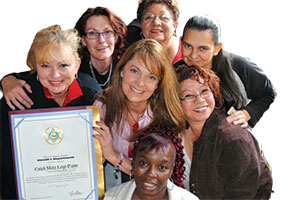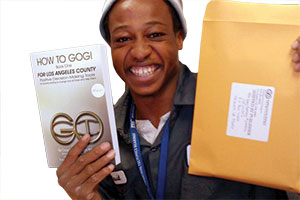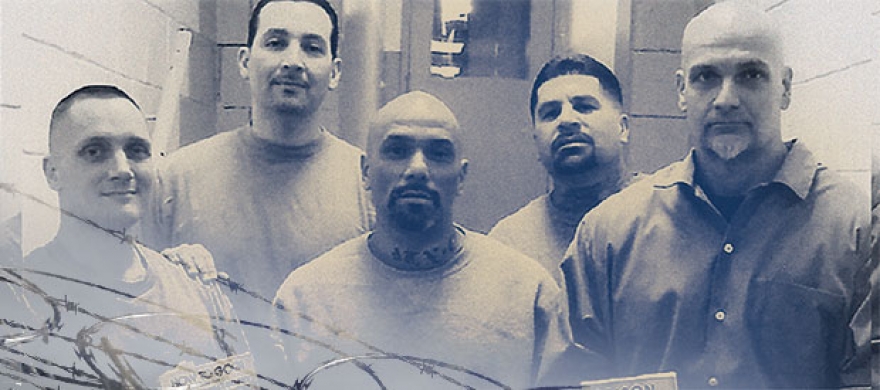Prison Break
Prison inmates helped Mara Leigh Taylor (MA ’03, MA ’06) find freedom and happiness.
When she walked into federal prison for the first time in 2002, Mara Leigh Taylor instantly felt a strong connection to the inmates and to the confined atmosphere.
“It was like being hit by a lightning bolt of understanding. The prison looked like
how I felt,” Taylor recalls. “I did not feel free or happy but I didn’t know why or
how to change that.”
A Pepperdine graduate student working toward her master’s degree in marriage and family
therapy, Taylor was at the prison on a class field trip led by professor Laurie Schoellkopf
of the Graduate School of Education and Psychology.
Taylor was also a struggling single parent with what she describes as “no real identifiable
career track.” She felt imprisoned.
“My life wasn’t turning out the way I had planned,” Taylor says. “I was miserable.” The unexpected connection Taylor experienced at the prison inspired her to volunteer
at Terminal Island federal prison in San Pedro, California. She led discussions with
inmates about being in prison, feeling trapped, and how to change their lives. As
she listened to the men she began to understand her own internal prison.
The unexpected connection Taylor experienced at the prison inspired her to volunteer
at Terminal Island federal prison in San Pedro, California. She led discussions with
inmates about being in prison, feeling trapped, and how to change their lives. As
she listened to the men she began to understand her own internal prison.
“They’d say, ‘I’m internally free,’ ‘I found God,’ or ‘I found education,’” and I
thought, ‘Wow, these men are happier than I have ever been. Why?’ In helping the prisoners,
I was really helping myself,” Taylor says. “I remember thinking, ‘Miracles could happen
here. There is unlimited potential for healing and to change from the inside out.’
I knew I could help them and I thought they could help me, too.”
Over the next decade, as Taylor listened to inmates discuss how they coped and improved
their behavior despite confinement, she discovered her own healing and happiness.
Inspired to share with other prisoners what she’d learned, Taylor developed a leadership
development/positive reinforcement training curriculum that prisoner participants
describe as a “way of life” to help incarcerated men and women transform themselves
into happy, productive citizens of their communities. She called it Getting Out By
Going In, or GOGI.
“People are always telling us the answers to our greatest problems, but we often refuse
to listen. When we really listen, all of the answers are right there,” Taylor says.
“The prisoners taught me the tools which gave me my freedom and now I am obligated
to share them with the men, women, and children who are in jails and prisons throughout
the United States.”
A nonprofit fully staffed by volunteers, GOGI helps rehabilitate prisoners through
the teaching of 12 core positive decision-making tools in group workshops and self-teaching.
Taylor and her team of formerly incarcerated coaches travel to prisons to teach actions
like “Five Second Light Switch” (replace
old, automatic thoughts with new, positive behavior) and “Positive Actions: The Three
Ps” (Is it powerful? Is it productive? Is it positive?).
GOGI is introduced in different ways. Often, one prisoner shares their donor-paid
GOGI book with their cellmate. When a significant number of inmates at a prison study
GOGI, they often request a workshop, which is also donor-funded. Workshops are run
by Taylor and other volunteers, who are known as “coaches.” The GOGI books and training
materials have reached tens of thousands of prisoners in 37 states, and counting.
The GOGI mailroom receives hundreds of letters each week from prisoners requesting
information, or reporting on their weekly GOGI group meetings in their respective
facilities.
Taylor wishes GOGI could reach more inmates, but the organization is donation driven
and fundraising is limited since much of the support comes from former and current
inmates and their families.
“Coach Taylor is an incredible human being who’s given her whole life to this cause,"
says Leigh Erin Carlson, GOGI national director of programs. “She’ll often say about
its success that, ‘It’s not me, it’s because of the prisoners.’” GOGI has been instrumental in helping thousands of inmates at the Correctional Training
Facility (CTF) in Soledad, California, to accept responsibility for their actions,
and to make positive changes in their lives as they reenter society, says warden Marion
Spearman.
GOGI has been instrumental in helping thousands of inmates at the Correctional Training
Facility (CTF) in Soledad, California, to accept responsibility for their actions,
and to make positive changes in their lives as they reenter society, says warden Marion
Spearman.
“GOGI has also helped my men exhibit pro-social behavior, thus leading to a positive
culture within the walls of the CTF,” Spearman explains. “GOGI has transformed many
lives and has instilled hope in many who had no hope.”
Following the principles not only in prison, but also upon release, is the key to
success in the outside world. Many continue with GOGI as volunteer facilitators. The
goal is for GOGI tools to become a way of life.
Taylor’s idea of empowering prisoners with tools for positive decision making and
then letting them create a positive prison culture seems to be working. Two recent
studies in California and Utah indicate that GOGI participants have a significantly
lower reoffending rate. In Los Angeles County, with one of the nation’s highest overall
re-offending rates at 85 percent, that figure dropped to 35 percent among GOGI participants.
In Utah, the figures are even greater, falling from 80 to 11 percent one year after
release among former female prisoners involved in GOGI.
“We all know that there’s a prison culture out there that’s a very negative one,”
Taylor says. “Where GOGI is introduced, there is an actual shift in the culture of
that facility and an option for those men and women who want to be positive. With
GOGI they learn that they are accountable to each other. They’ll say, ‘Hey man, you’re
not being GOGI right now. Where are your GOGI tools?’”
Maria Fierro and her husband David Merrihue are one of many GOGI success stories.
Before GOGI came into their lives, the couple was arrested together at their home
for selling drugs. She was sent to prison in Los Angeles and he was incarcerated at
Pelican Bay in Northern California. Their child was placed into alternative care,
the first stop for many children of incarcerated parents before the child is adopted
out or relegated to a life in foster care. It was not the couple’s first arrest.
Born in prison to a woman accused of attempted murder, Fierro was raised by an abusive
grandmother. Fierro became a drug addict and alcoholic and was arrested multiple times
over the years for trespassing, driving without a license, selling drugs, and other
crimes.
“Because of the experiences I had as a child growing up, I was broken and would always
go back to the drugs, because I didn’t know how to deal with the hurt,” Fierro says.
“I’m learning through GOGI that there is a separation between experiences and the
actual person I am today.”
Fierro was a Los Angeles County prison inmate when she met Taylor, who was teaching
GOGI lessons there. Fierro initially refused any part of the program.
“I was angry and didn’t want to hear what some lady who was free had to say,” Fierro
recalls. “What did she know about me and my life? But she kept coming back, day after
day, week after week. I figured, if nothing else, this lady was sincere.”
That is when things changed for Fierro.
“For the first time in my life I saw someone being truthful with me and not wanting
something from me. I was able to tell my story,” Fierro says. “I started releasing
all the stuff that I had been holding onto. And I began to feel happier, because I
started creating space inside myself.”
She turned her life around, found work, a stable home, and regained custody of her
child.
“I’ve been given a second chance to be the mother that I was meant to be,” Fierro
comments. “In jail is where I found my freedom, where thousands of inmates are studying
GOGI and finding their
same freedom.”
Fierro asked Taylor to send the GOGI book to Merrihue, who at first was mystified
by the book’s rules and threw it on the ground multiple times over several weeks.
Desperate to change his life, Merrihue picked up the book again. This time the principles
became clear.
“The book helped me learn to claim responsibility for my actions and changed my attitude,”
says Merrihue, who spent 16 years in and out of county jails and state prison. “This
was the first time I was able to cope with life on life’s terms.”
Merrihue now serves as a GOGI facilitator in state prisons and in Los Angeles County
men’s jail, leading current inmates in learning GOGI tools. Fierro serves as GOGI
Hotline manager answering calls from people requesting books, materials, and programming
information. Taylor calls Fierro and Merrihue “GOGI miracles.”
There are critics who oppose helping criminals like Fierro and Merrihue, insists Carlson,
but it’s important for society to redirect prisoners to a more positive lifestyle. “If you or your family have been victimized by somebody, it’s understandable that
you would have difficulty wanting to assist prisoners,” Carlson comments. “What we’re
doing is critical for the community, because 95 percent of people who are incarcerated
are going to get out. We ask people, ‘Do you want them to come out and break into
your house again or do you want them making positive decisions?’”
“If you or your family have been victimized by somebody, it’s understandable that
you would have difficulty wanting to assist prisoners,” Carlson comments. “What we’re
doing is critical for the community, because 95 percent of people who are incarcerated
are going to get out. We ask people, ‘Do you want them to come out and break into
your house again or do you want them making positive decisions?’”
The culture shift which is occurring as a result of GOGI has been organic and prisoner
driven, confirming Taylor’s commitment to prisoners who want to create a different
lifestyle, in or out of prison. Many, Taylor says, are not aware that they can change
their lives, because they have only had negative reinforcement. Compounding the issue
is the generational component of crime. Parents in prison are four times more likely
to have children who end up in prison, too. GOGI teaches that parents in prisons and
jails must learn how to break the cycle of incarceration through positive tools that
they can teach their youngsters.
“We create a breeding ground for more criminals, because we are not taking care of
the reasons why they are doing it,” Carlson remarks. “If alternatives are provided,
then prisoners want to give back upon their release, because they feel they’ve been
given so much.”
Taylor credits GOGI’s grassroots beginning with its national expansion. By focusing
on listening and permitting the prisoners to develop the tools and materials, GOGI
is increasingly endorsed by prisoners as “created by prisoners, for prisoners.”
“But we can’t stop there,” says Taylor. “GOGI will eventually make its way out of
the prisons and into the school rooms where these simple tools can be taught to school-
children so they can avoid negative decisions in the first place.”
Her volunteer work over the past decade has been so successful that the L.A. County
Sheriff’s Department recently created a paid position specifically for Taylor. She
is now the educational development administrator for jail programming for nearly 20,000
men and women.
“We have a long way to go before we introduce positive decision making to every prisoner
in the United States,” Taylor says.
Grateful for the direction her life has taken, Taylor continues to credit Pepperdine
for presenting her with the first opportunity that opened her eyes to a pervasive
problem. “If I didn’t take that class at Pepperdine, I never would have toured that
prison,” Taylor says. “I’m living the University mission.”
Hear Maria Castro and others tell their GOGI success stories: gettingoutbygoingin.org
